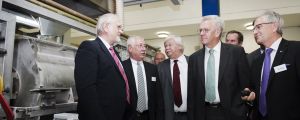To successfully master the energy turnaround, efficient technologies are required. The Minister-President of Baden-Württemberg, Winfried Kretschmann, visited Karlsruhe Institute of Technology (KIT) today and informed himself about a new energy-efficient and environmentally compatible cement: Celitement is an example of trend-setting energy research in Karlsruhe and of innovations made by KIT, which are then made available to society in close cooperation with industry. In the beginning was the idea of the KIT scientists. Today, Celitement GmbH – a spin-off of KIT and the industry partner Schwenk – is developing this new material to maturity at a pilot plant.
“In my opinion, KIT renders outstanding services in research and education and, at the same time, it consistently strives for the transfer of scientific findings to practice. To successfully master the energy turnaround, we need innovations, such as the environmentally compatible cement “Celitement” developed by KIT. Also in the fields of energy efficiency, electromobility, and renewable energies, I expect KIT to give major stimuli, as it is the leading energy research institution in Germany,” said the Minister-President.
“We will support the energy turnaround with full vigor,” emphasized KIT Presidents Professor Eberhard Umbach and Professor Horst Hippler. At KIT, 1200 scientists are working hard for the energy mix of the future. Holistic research is also conducted in the field of electromobility. ”At KIT, we do not only concentrate on individual components, but analyze the complete system from the molecule to the battery, to the electric engine, to the functioning electric power train, to the vehicle in traffic. Our objective always is maximum benefit for the society.”
The KIT Presidents also appealed to politics: To master the technical challenges of the future, wide support and funding of research by the state and society are urgently required.
Kretschmann visited KIT on the occasion of a meeting of employers associations in Baden-Württemberg at KIT today. “The fact that you are here today is a token of extensive exchange between KIT and industry. We are highly interested in cooperating with you,” said the Presidents in their welcome address to the employers.
Celitement GmbH is an example of successful dialog. The spin-off of KIT and the Schwenk group has built a pilot plant on KIT Campus North, which will produce 100 kg of this sustainable material daily. The objective is its further development to maturity. Production of the cement developed by KIT requires about half of the energy only and emission of climate-affecting carbon dioxide (CO2) is halved compared to conventional processes. Presently, the production of cement worldwide is responsible for about 3% of worldwide energy consumption and 6% of worldwide CO2 emission. Recently, Celitement GmbH was granted the Special Environmental Technology Award of the state of Baden-Württemberg and won the competition of “Land of Ideas”.
Being “The Research University in the Helmholtz Association”, KIT creates and imparts knowledge for the society and the environment. It is the objective to make significant contributions to the global challenges in the fields of energy, mobility, and information. For this, about 10,000 employees cooperate in a broad range of disciplines in natural sciences, engineering sciences, economics, and the humanities and social sciences. KIT prepares its 22,800 students for responsible tasks in society, industry, and science by offering research-based study programs. Innovation efforts at KIT build a bridge between important scientific findings and their application for the benefit of society, economic prosperity, and the preservation of our natural basis of life. KIT is one of the German universities of excellence.

